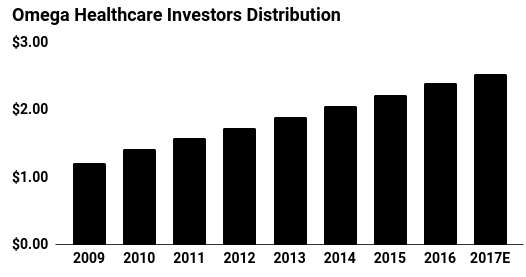OHI Stock: This Landlord’s 9.5% Yield Is Growing

A 9.5% Yield With Upside
Over the next couple of decades, few businesses will likely mint more money than senior homes.
Each year, four million baby boomers turn 65. That will push up demand for everything from doctor’s offices and nursing homes to retirement communities and assisted living facilities.
One name poised to profit from this boom: Omega Healthcare Investors Inc (NYSE:OHI). The real estate investment trust (REIT) owns a portfolio of senior living properties and mortgages on other healthcare facilities. And, with a distribution yield topping 9.5%, these units look tempting to yield-hungry investors.
We have a big safety net here, for starters.
When evaluating REITs, I track performance through fund flows from operations (FFO). This provides a better gauge of profitability than normal earnings.
In their most recent quarter, management projected that full-year 2017 FFO will come in between $3.27 and $3.28 per share. At the same time, the partnership’s annual dividend comes out to $2.60. This 80% payout ratio sits a little outside of my comfort zone, but leaves management a little wiggle room if business dips.
This income stream continues to grow.
The company said it had purchased two new properties, totaling over $200.0 million. Moreover, management has plowed over $415.0 million back into the business—a combination of property purchases and renovations—to boost portfolio income and justify higher rents.
Those investments today will likely pay off. Omega has boosted its payout now for 21 consecutive quarters, growing the distribution at a 9.5% annual clip since 2009. Analysts expect cash flow—and, by extension, this distribution—to increase at roughly the same clip through 2022.

(Source: Yahoo! Finance, last accessed November 17, 2017
Which raises the question, “If Omega is so great, why do shares yield nearly ten percent?”
Over the past year or so, some of Omega’s tenants have struggled with wage inflation, higher liability risk, and tight credit conditions. Some operators have fallen behind on their rent, failing to make lease payments on a timely basis.
That, understandably, has put senior housing landlords in the dog house. Wall Street doesn’t have the patience to sit through a few bad quarters. And, in the case of Omega, it could mean that distribution hikes over the next few years will be less than expected.
Late rent payments likely won’t put the distribution at risk, however.
As mentioned above, management has left more than enough wiggle room to handle some defaults. In the most likely scenario, executives will negotiate lower lease payments with troubled tenants, keep the cash flow rolling in, and (maybe) reduce the pace of distribution increases.
Certainly not ideal.
But, for those with a little patience, Omega’s long-term outlook still looks rosy. And with an upfront yield of 9.5%, new unitholders may be willing to accept a bad quarter or two.











